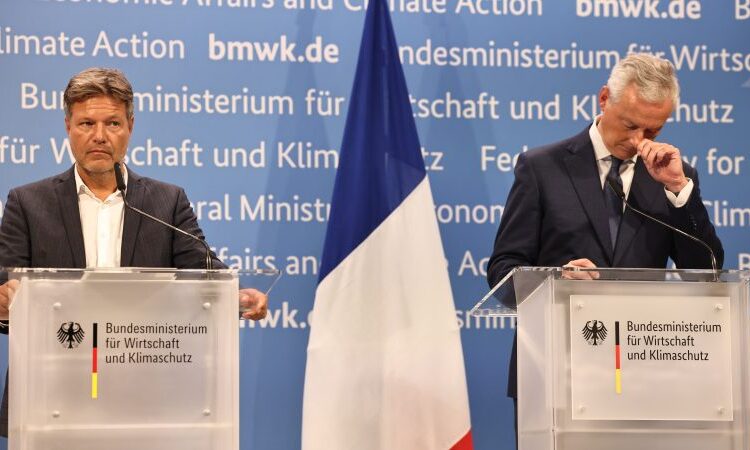
Ahead of June’s EU elections and a new European Commission, France and Germany are looking to set the agenda with a joint paper calling for the adoption of a European Tech Deal and forceful reforms to slash red tape.
Europe’s economic competitiveness is a key talking point in Brussels and national capitals. Now, the bloc’s two largest economies have adopted a joint paper setting out how the next European Commission should reignite the bloc’s growth prospects.
The report put forward by France’s Bruno Le Maire and German Vice-Chancellor Robert Habeck on Wednesday (23 May) is titled ‘Boosting growth in Europe – a French-German initiative for the next five years’.
The paper is not yet officially backed by the German government but will be the basis of top-level discussions between the two governments from 26 to 28 May at the picturesque Meseberg castle, north of Berlin.
The joint position is a response to “the turning point” Europe finds itself in, explained Kirsten Scholl, head of EU policy at the German Ministry of Economy and Climate Action. She noted that the paper follows from French President Emmanuel Macron’s second Sorbonne speech in April, which laid out his vision for Europe.
The two countries share the diagnosis that Europe is an ailing titan with vast potential, tied down by overzealous red tape.
“The fact that the two biggest economies agree on a common diagnosis is the first very important step,” Malo Carton, Le Maire’s deputy chief of staff, told the press.
Europe should “ambitiously eliminate unnecessary administrative burdens” and “forcefully reform, simplify, and fast-track administrative procedures and EU funds,” the joint paper stated, echoing similar calls from business groups.
To put these “forceful” reforms into law, the two ministries urged the next European Commission “to adopt an ambitious work plan in the coming months.”
Given the combined economic and political weight of Germany and France, their joint positions often fundamentally shape EU policy.
A new European Tech Deal
Following the current Commission’s Green Deal, the two countries propose that the next Commission introduce a ‘European Tech Deal’, to “accelerate digitalisation across industries and seize opportunities in the most innovative technologies”.
For Paris and Berlin, that means backing the EU’s recently-enacted digital rules, designed to tackle the near-monopolistic rule of US tech giants like Meta or Apple.
“We need to implement our common rules with strong supervision,” the two ministers stressed in the paper.
The invisible gridlock
However, the joint document does not solve the sticking points that have strained the Franco-German German relations in recent months.
While noting the overall investment needs of €620 billion per year to reach the climate and energy targets, plus €125 annually for digitisation, the text was vague on how much of this should be met from public funding.
“Private financing is the natural first contributor to fill this investment gap,” the two ministers noted, voicing support for the EU’s Capital Markets Union (CMU) agenda, which Commission President Ursula von der Leyen claimed can raise an additional €470 billion per year of private investment.
Public support should also act as a “catalyst”, the paper noted, without mentioning whether new funds would be needed.
The second major sticking point between Paris and Berlin was circumvented with the formulation that they would continue to “work together to find common ground on the future EU climate and energy framework for 2040”.
That means agreement on the 2040 climate target in principle, but less consensus on the energy mix needed to get there.
Green protectionism
Faced with the spectre of deindustrialisation – which industry attributes in part to EU climate measures like the bloc’s worldwide leading CO2 price – the two countries count on tariffs to keep industry in Europe.
“We have to swiftly implement CBAM and create clarity, efficiency, effectiveness, and simplicity in its implementation,” the ministers agree. The ‘Carbon Border Adjustment Mechanism’ is the EU’s CO2 border tax, which aims to level the playing field between cleaner European products and dirtier imports.
The goal remains to “implement our climate targets while making sure to effectively prevent carbon leakage.”
The EU’s CO2 border tariff is currently limited to a few basic products, which France and Berlin want to change. Avoiding carbon leakage means taking “downstream sectors and exporters into account,” the paper said.
[Edited by Donagh Cagney/Zoran Radosavljevic]







